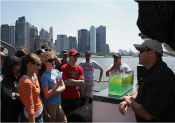| |  |
Ocean observing systems (OOS) provide a wealth of real-time data that can be put to use in classrooms and informal learning centers. This presents an exciting opportunity to connect students and the public to real-world science. Additionally, when students analyze real-time data in structured learning environments, it can help them improve their inquiry skills while exposing them to relevant ocean science topics to increase their level of ocean knowledge.
However, building tools to help students, teachers and the public access and understand real-time data effectively presents many logistical and design challenges. Data displays must be presented clearly using age-appropriate intuitive interfaces. Science content and visualizations must be constructed in ways that address how people learn and build upon the prior knowledge of the end-user. And above all, the information presented must be made meaningful for the intended audience, ideally through the use of engaging and personally relevant stories.
To address these challenges, a collaborative group of scientists, classroom and informal educators, education researchers, and data translators have worked together to develop several novel approaches to bring real-time OOS data to classroom and public audiences. This team was brought together by the Centers for Ocean Sciences Education Excellence Networked Ocean World (COSEE NOW), a virtual community of scientists and educators seeking to foster collaborations that will engage participants in the development of new products that promote the Ocean Literacy essential concepts.
A review of audience and stakeholder needs assessments informed the development of several prototype projects, including: 1) real-time ocean data worksheets that provide an quick means to integrate data into the classroom, 2) extended curriculum units that tie real ocean data with current science research, and 3) museum displays of OOS datasets presented in a narrative structure. These projects are developed using an iterative design process, in which formative assessments are used to steer future development.
Presented by: C. Sage Lichtenwalner, Janice D. McDonnell, Chris Parsons, Laura Dunbar, and Scott M. Glenn
2010 Ocean Sciences Meeting, Portland, OR
DOWNLOAD (12.44 MB) >>
|

